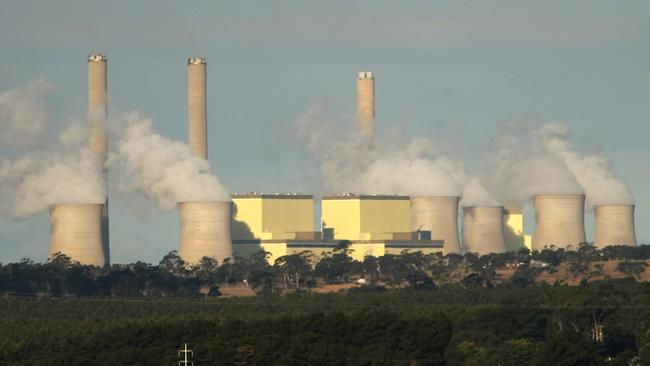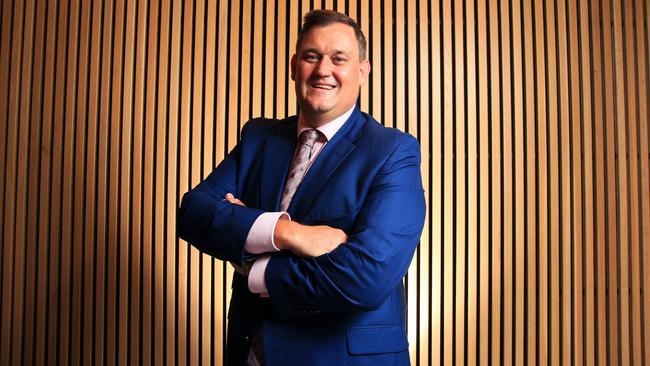Energy giants unite to pursue green power grid reforms
Four of Australia’s largest electricity companies have formed a high level group to pursue major energy reforms criticised by renewable developers.

The chief executives of the nation’s biggest electricity companies have formed a high-level group to strike a united position on controversial energy reforms, thwarting irate renewables developers worried the changes will decimate investment in new supply.
The CEOs of major coal generator Delta Electricity and three of the biggest retailers – Alinta Energy, EnergyAustralia and Origin Energy – have held several phone hook-ups in the past week over concern the wide-ranging policy proposals may not fully solve problems in the grid unless the industry can find common ground.
The most controversial idea is the Energy Security Board’s plan to pay coal generators to guarantee future capacity, known as a type of capacity market.
Clean energy developers have savaged plans recommended by the ESB, worried the capacity plan will have a “chilling effect” on renewables companies investing in new supply.
But big generators say the mechanism is needed to ensure coal and gas remain operating and keep the power grid secure against a backdrop of more renewables entering the system.
Coal, gas and hydro plants will be paid under the plan to guarantee future capacity when the grid is facing periods of peak demand that threaten reliability rather than being paid on an “energy only’’ basis for the power that is used by consumers.
Renewable generators are worried it will simply favour existing thermal suppliers at their expense.
The four energy giants are not yet aligned on the capacity issue. While Trevor St Baker’s Delta and EnergyAustralia are in favour of the mechanism, Alinta holds concerns over its design, while Origin favours a targeted model for new dispatchable resources.
The CEO meeting – involving Delta head Greg Everett, EnergyAustralia’s Mark Collette, Alinta’s Jeff Dimery and Origin boss Frank Calabria – was created to iron out their differences and ensure that once-in-a-generation changes to the power grid are not squandered.
The group will hold talks and consultations with the ESB and the Morrison government over the reforms. Issues to consider include whether the Australian Energy Market Operator would be in charge of the capacity mechanism or whether it would be a decentralised version where compliance was left with retailers.
While the CEOs held the initial meetings, it is expected senior executives from the companies will be tasked with developing a shared position for the group.
Australia’s biggest generator, AGL Energy, is not currently involved in the group as it concentrates on a major split of the company through a demerger.

The AGL-backed Powering Australian Renewables consortium warned earlier this week that the controversial energy reforms may derail investment in the sector and posed added risks for clean energy developers.
Energy Minister Angus Taylor has said the ESB recommendations would be considered among reforms before a final package is sent to the national cabinet for a decision later this year.
Alinta, owner of the Loy Yang B coal plant in Victoria’s Latrobe Valley, said the reforms should aim to keep the grid secure and were not about favouring one generation type over another. It pointed to the success of Western Australia’s power market, which already has a capacity market in place.
“This isn’t about renewables versus coal,” Alinta chief executive Jeff Dimery told The Australian. “This is about making sure that as we transition to a low-carbon economy and by definition, we reduce the emissions of the stationary energy sector, that we actually maintain the security of supply and keep the lights on,” Mr Dimery said. “Really, what we’re asking for is to have a transparent market that rewards specific services that are provided to that market appropriately.”
Alinta in June called for the federal government to step in as a lender of last resort due to difficulties securing bank funding for the nation’s remaining coal plants, amid escalating climate concerns.
However, Mr Dimery said support for a form of capacity mechanism in the national electricity market was not about safeguarding or extending the life of coal plants.
“We’re not espousing here that capacity payments be used to prop up thermal generation of any kind beyond its design life. We’re not looking for a kick at all,” Mr Dimery said.
“What we’re saying is that if this plant is required by the market, then the market should acknowledge it is required and make available capacity payments which create certainty to underpin maintenance programs and the like. And if it’s not required then it won’t earn capacity payments and it will close.”
Energy Security Board chair Kerry Schott has called for a well-structured transition plan to help Australia manage the eventual exit of the fossil fuel.
The Australian Energy Market Operator has previously backed plans to introduce a new price mechanism reflecting the important reliability role provided by power stations, which are currently struggling to receive any value for their generation when they get undercut by renewables that can produce at close to zero cost.
The ESB noted that recent investment in renewables generation had been supported by government subsidies, and mechanisms might need to be put in place to ensure the right supply mix is in place for the grid over the coming decades.





To join the conversation, please log in. Don't have an account? Register
Join the conversation, you are commenting as Logout